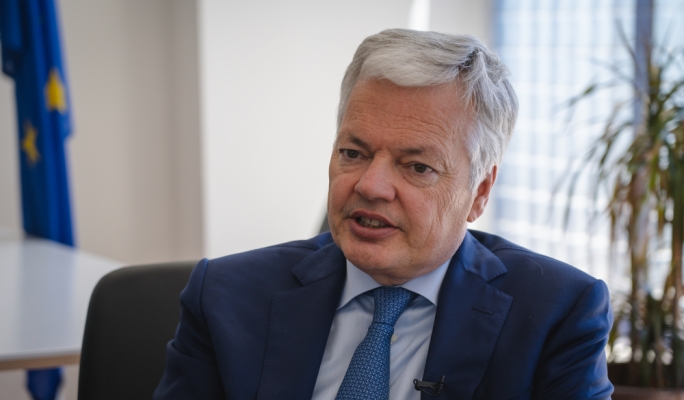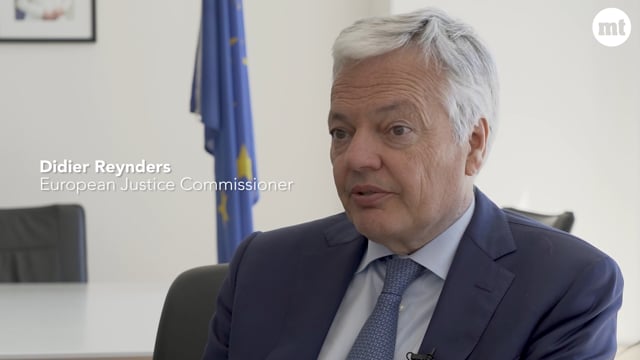

With billions of euros in Russian assets frozen by EU member states, Didier Reynders does not mince his words about the paltry €200,000 frozen by Malta.
“It is so low that it is abnormal,” he tells me as we sit for an interview at the European Commission representation in Valletta.
He raised the issue in each of his meetings with members of the Maltese government during a two-day visit last week.
We sit in an office that has beautiful views of the Grand Harbour. Opposite us are the bastions of Fort St Angelo and Isla adorned with the historic watchtowers, known as gardjoli.
The European Commission office stands tall above the buildings and port below it, almost a reminder of its job to stand watch over the member states.
As European Commissioner for Justice, Reynders leads the task force responsible for monitoring the freezing of assets of Russian oligarchs and entities sanctioned by the EU after Russia invaded Ukraine.
“In 27 countries, it was possible to freeze more than €24 billion; in some member states billions of euros were frozen but in Greece and Malta it’s only just more than €200,000,” he says perplexed by the situation.
Reynders praises Malta’s solidarity with Ukraine and the stand against Russian aggression that it has championed on the UN Security Council.
However, he questions how Malta could only freeze such a measly sum in Russian assets when its golden passport scheme requires applicants to invest in the country.
Malta stopped accepting applications from Russian nationals for its citizenship by investment programme shortly after the aggression against Ukraine started last year. However, Russians had been among the top citizen groups seeking a Maltese passport in the preceding years. Malta has always prided itself in having a rigorous due diligence process but evidently this is not enough to placate concerns within the European Commission.
Reynders asks: “How is it possible to explain that in the past there was some form of investment scheme to acquire citizenship and yet you get people with no real estate or bank accounts in Malta?”
He says there may be a logical reason for this but expects a more detailed explanation with “facts and figures” then what he was given during the visit.
“We need to be sure that there are concrete actions to try and freeze assets in Malta or to help other member states to freeze assets coming from Russian citizens with a link to Malta such as having yachts based here,” he says, adding “I am sure it is possible to detect more than has already been frozen.”
It is no surprise that Reynders brings up the golden passport scheme. The European Commission has opened infringement proceedings against Malta over its citizenship by investment programme and the matter is pending in front of the European Court of Justice.
The Maltese government is arguing that citizenship is a national competence but Reynders begs to differ. He says the issue concerns the sale of “European values” and in Malta’s case, “for budgetary reasons”.
“If you are given a golden passport, you are also given European citizenship and the possibility to work, travel and visit all the different member states and to take part in citizenship at EU level… so, what we have said from the beginning is we need to stop such an idea to sell European values and citizenship,” he argues.
Reynders says similar citizenship schemes in Bulgaria and Cyprus were stopped following dialogue with the Commission but the Maltese government has insisted the programme was important for “budgetary reasons”.
“We await the ECJ’s decision, which will be binding. We will adhere to the ruling but if the decision is to stop, of course, it will be important for Malta to stop the programme,” he says.
Daphne murder: Quest for final judgments
I ask him whether he is satisfied with the reforms Malta has enacted over the past couple of years in the wake of Daphne Caruana Galizia’s murder and his first reaction is to insist on the need for all those involved in the assassination to be brought to justice.
And by justice he means final judgments of guilt or otherwise on all those involved in her murder and the high-level corruption cases she wrote about.
“It is important to reach the end of the process… the Commission has insisted on this since the beginning of the discussions with the Maltese authorities on the murder,” he tells me.
Reynders acknowledges the reforms that were carried out, especially in the justice system but cites the Commission’s rule of law report from last year, which called for the ‘correct implementation’ of the reforms.
The 2022 assessment recommended that Malta address the length of investigations of high-level corruption cases and establish a ‘robust track record’ of final judgments.
I ask him whether the problem is one of lack of resources and antiquated procedures, or simply a lack of willingness.
“Both,” he replies. “There is continuous need to invest in the justice system, the police, the Attorney General office to be able to organise the prosecution process with enough human resources, and digital tools… but what we ask for is not only to have investigations started but to reach final judgments.”
He also calls for greater cooperation between Maltese institutions and European bodies such as Europol and the European Public Prosecutor’s Office (EPPO).
“The most important element is the willingness from all the actors to work together and not say we are doing the job by ourselves,” he says.
Two weights, two measures
I ask about the prevalent feeling in Malta that the EU has adopted two weights and two measures when dealing with rule of law issues in the member states. I suggest that Brussels acted tough on Malta because it is a small country but adopted a more lenient approach with larger states like Poland and Hungary with more serious challenges to the rule of law.
Reynders shoots down the suggestion and insists the facts and figures prove otherwise.
He says the Commission is having “a huge discussion” with Poland about important judicial reforms, insisting that without the necessary changes Poland will not be receiving funds from the recovery and resilience plan.
He says that on the Commission’s request, the European Court of Justice fined Poland €1 million per day for a whole year, which was later reduced to €500,000 as a result of some reforms.
He adds that more than €6 billion are blocked for Hungary because of rule of law deficiencies.
“We are using other tools that are more efficient with a financial consequence in Hungary and Poland… we do not have double standards. We are using the same methodology with all the member states and every year we publish rule of law reports for all 27 member states,” he says.
I bring up the Qatargate scandal involving bribery of some current and former members of the European Parliament and ask whether this has damaged the EU as an institution.
“I have mixed feelings about this because of course it damages all institutions to see such kind of behaviour but it is also proof that it’s possible for an independent justice system to aim very high in its investigations,” he says.
Reynders emphasises that what we now know about the scandal is the result of a law enforcement authority doing its job to investigate and prosecute. It’s what he also hopes to see done in Malta on cases of high-level corruption, a message he keeps repeating even as we close off the discussion for the waiting buffet lunch his aides have prepared.





